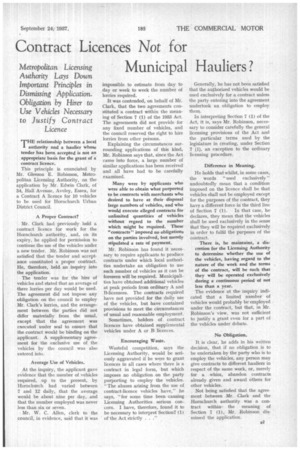Contract Licences Not for
Page 41

If you've noticed an error in this article please click here to report it so we can fix it.
Municipal Hauliers?
Metropolitan Licensing Authority Lays Down important Principles in Dismissing Application. Obligation by Hirer to Use Vehicles Necessary to Justify Contract
Licence
THE relationship between a local authority and a haulier whose tender has been accepted is not an appropriate basis for the grant of a contract licence.
This principle is enunciated by Mr. Gleeson E. Robinson, Metropolitan Licensing Authority, on the application by Mr. Edwin Clark, of 34, Hall Avenue, Aveley, Essex, for a Contract A licence for 10 vehicles to he used for Hornchurch Urban District Council.
A Proper Contract?
Mr. Clark had previously held a contract licence for work for the Hornchurch authority, and, on its expiry, he applied for permission to continue the use of the vehicles under a new tender. Mr. Robinson was not satisfied that the tender and acceptance constituted a proper contract. He, therefore, held an inquiry into the application.
The tender was for the hire of vehicles and stated that an average of three lorries per day would be used. The agreement did not impose any obligation on the council to employ Mr. Clark's lorries, and the arrangement between the parties did not differ materially from the usual, except that the agreement was executed under seal to ensure that the contract would be binding on the applicant. A supplementary agreement for the exclusive use of the vehicles by the council was also entered into.
Average Use of Vehicles.
• At the inquiry, the applicant gave evidence that the number of vehicles required, up to the present, by Hornchttrch had varied between 7 and 12 daily, that the average would be about nine per day, and that the number employed was never less than six or seven.
Mr. W. C. Allen, clerk to the council, in evidence, said that it was
in/possible to estimate from day to day or week to week the number of lorries required.
It was contended, on behalf of Mr. Clark, that the two agreements constituted a contract within the meaning of Section 7 (1) of the 1933 Act. The agreements did not provide for any fixed number of vehicles, and the council reserved the right to hire lorries from other persons.
Explaining the circumstances surrounding applications of this kind, Mr. Robinson says that, since the Act came into force, a large number of similar applications has been received and all have had to be carefully examined.
Many were by applicants who were able to obtain what purported to be contracts with merchants who desired to have at their disposal large numbers of vehicles, and who would execute alleged contracts for unlimited quantities of vehicles without regard to the number which might be required. These "contracts" imposed no obligations on the parties involved, but merely stipulated a rate of payment.
Mr. Robinson has found it necessary to require applicants to produce contracts under which local authorities undertake an obligation to use such number of vehicles as it can be foreseen will be required. Municipalities have obtained additional vehicles at peak periods from ordinary A and B-licensees. The contracts required have not provided for the daily use of the vehicles, but have contained provisions to meet the circumstances of usual and reasonable employment.
Sometimes, holders of contract licences have obtained supplemental vehicles under A or B licences.
Encouraging Waste.
Wasteful competition, says the Licensing Authority, would be seriously aggravated if he were to grant licences in all cases where there is a contract in legal form, but which imposes no obligation on the party purporting to employ the vehicles. "The abuses arising from the use of contract-licence vehicles have," he says, "for some time been causing Licensing Authorities serious concern. I have, therefore, found it to be necessary to interpret Section7 (1) of•the Act strictly . . ."
Generally, he has not been satisfied that the authorized vehicles would be used exclusively for a contract unless the party entering into the agreement undertook an obligation to employ them.
In interpreting Section 7 (1) of the Act, it is, says Mr. Robinson, necessary to consider carefully the general licensing provisions of the Act and the particular terms used by the legislature in creating, under Section 7 (1), an exception to the ordinary licensing procedure.
Difference in Meaning.
He holds that whilst, in some cases, the words used exclusively" undoubtedly mean that a condition imposed on the licence shall be that vehicles shall not be employed except for the purposes of the contract, they have a different force in the third line of Section 7 (1). In that case, he declares, they mean that the vehicles shall be used exclusively in the sense that they will be required exclusively in order to fulfil the purposes of the contract.
There is, he maintains, a discretion for the Licensing Authority to determine whether the use of the vehicles, having regard to the nature of the work and the terms of the contract, will be such that they will be operated exclusively during a continuous period of not less than a year.
The evidence at the inquiry indicated that a limited number of vehicles would probably be employed under the contract, but that, in Mr. Robinson's view, was not sufficient to justify a grant even for a part of the vehicles under debate.
No Obligation.
It is clear, he adds in his written decision, that if no obligation is to be undertaken by the party who is to employ the vehicles, any person may give contracts to different hauliers in respect of the same work, or, merely for a whim, abandon contracts already given and award others for other vehicles.
Not being satisfied that the agree meat between Mr. Clark and the Homchurch authority was a contract withinthe meaning of Section 7 (1), Mr. Robinson dismissed the application.




























































































